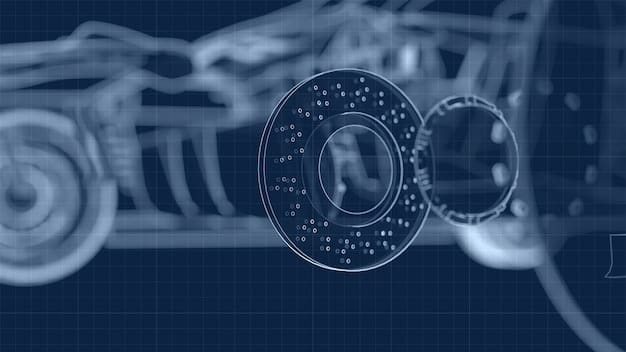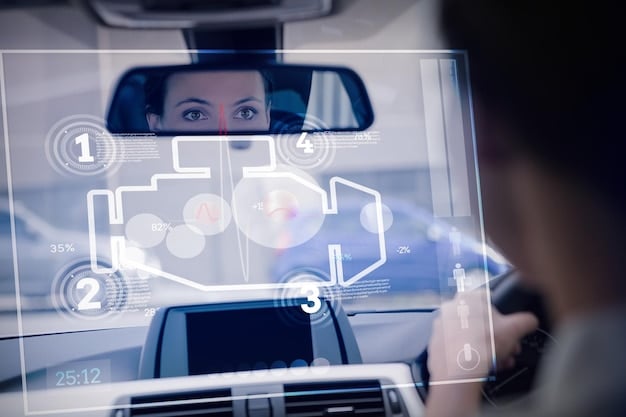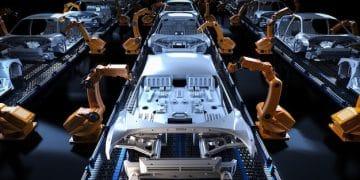Blockchain in Automotive: Transforming the Industry

Exploring the potential of blockchain technology in the automotive industry reveals opportunities for enhanced security, transparency, and efficiency across various sectors, from supply chain management to vehicle lifecycle tracking and the development of decentralized mobility solutions.
The automotive industry is on the cusp of a technological revolution, and blockchain technology is poised to be a key driver of this transformation. **Exploring the potential of blockchain technology in the automotive industry** reveals a landscape of opportunities ranging from secure data management to streamlined supply chains.
Unlocking Automotive Innovation with Blockchain
Blockchain technology, initially known for its role in cryptocurrencies, is now being recognized for its diverse applications across various industries. In the automotive sector, blockchain offers solutions to challenges related to data security, supply chain transparency, and overall operational efficiency. This section explores the foundational aspects of blockchain and its relevance to the automotive industry.
Understanding Blockchain Fundamentals
At its core, blockchain is a distributed, immutable ledger that records transactions across many computers. This decentralized nature makes it highly secure and transparent. The technology relies on cryptographic principles to ensure data integrity, creating a tamper-proof record of all transactions.
Why Blockchain Matters for Automotive
The automotive industry generates vast amounts of data, from vehicle manufacturing to customer usage. Blockchain can provide a secure and transparent platform for managing this data, ensuring that it remains accurate and protected from unauthorized access. This is crucial for maintaining trust and accountability across the entire automotive ecosystem.

Here are several ways blockchain can benefit the automotive industry:
- Enhanced Security: Protects against data breaches and cyberattacks.
- Improved Transparency: Provides a clear and auditable record of all transactions.
- Increased Efficiency: Streamlines processes and reduces administrative overhead.
- Greater Trust: Fosters confidence among stakeholders through secure data sharing.
In summary, blockchain technology presents a unique opportunity to revolutionize the automotive industry by enhancing security, transparency, and efficiency across its various operations. Understanding these core benefits is crucial for appreciating the full potential of blockchain in this sector.
Securing the Automotive Supply Chain
The automotive supply chain is a complex network involving numerous suppliers, manufacturers, and distributors. Blockchain technology can significantly enhance the security and transparency of this intricate system, ensuring the authenticity and integrity of components from origin to final assembly.
Tracking Vehicle Components
One of the most promising applications of blockchain is the ability to track and trace vehicle components throughout the supply chain. By recording each transaction and transfer of ownership on a blockchain, manufacturers can verify the authenticity of parts and prevent the introduction of counterfeit or substandard materials.
Benefits of Blockchain in Supply Chain Management
Blockchain can offer several key advantages in managing the automotive supply chain. These include improved traceability, reduced risk of fraud, and enhanced efficiency in logistics and inventory management. The transparency provided by blockchain can also help to build trust among all stakeholders in the supply chain.
Consider these benefits of applying blockchain to automotive supply chains:
- Traceability: End-to-end tracking of components from origin to assembly.
- Fraud Prevention: Verification of part authenticity and reduction of counterfeit materials.
- Efficiency: Streamlined logistics and real-time inventory management.
- Trust: Enhanced confidence among suppliers, manufacturers, and distributors.
In conclusion, blockchain technology offers a robust solution for securing the automotive supply chain. By providing a transparent and immutable record of all transactions, it enhances traceability, reduces fraud, and improves overall efficiency.
Enhancing Vehicle Lifecycle Management
Managing a vehicle’s lifecycle, from initial registration to eventual disposal, involves numerous transactions and data points. Blockchain technology can streamline this process, providing a secure and transparent record of a vehicle’s history, ownership, and maintenance.

Tracking Vehicle History
Blockchain can be used to create a comprehensive and tamper-proof record of a vehicle’s history, including ownership changes, accident reports, and maintenance records. This information can be securely shared with authorized parties, such as potential buyers, insurance companies, and regulatory agencies.
Improving Transparency and Trust
By providing a transparent and immutable record of a vehicle’s history, blockchain can help to reduce fraud and increase trust in the used car market. Buyers can have greater confidence in the accuracy of the information they receive, and sellers can demonstrate the value of their vehicles.
Here’s how blockchain can revolutionize vehicle lifecycle management:
- Secure Records: Immutable record of vehicle history, ownership, and maintenance.
- Fraud Reduction: Transparent history reduces fraud in the used car market.
- Increased Trust: Buyers gain confidence in the accuracy of vehicle information.
- Streamlined Processes: Simplifies data sharing with authorized parties.
In summary, blockchain technology offers a powerful tool for enhancing vehicle lifecycle management. By providing a secure and transparent record of a vehicle’s history, it helps to reduce fraud, increase trust, and streamline various processes throughout the vehicle’s life.
Revolutionizing Mobility Services
The rise of ride-sharing, car-sharing, and autonomous vehicles has created new challenges for mobility service providers. Blockchain technology can offer innovative solutions for managing these services, ensuring secure transactions, efficient operations, and enhanced user experiences.
Decentralized Ride-Sharing Platforms
Blockchain can enable the creation of decentralized ride-sharing platforms that eliminate the need for intermediaries. This allows drivers and riders to connect directly, reducing costs and increasing transparency. Smart contracts can automate payment processes and ensure that both parties fulfill their obligations.
Secure Data Management
Mobility service providers collect vast amounts of data about their users and vehicles. Blockchain can provide a secure and private platform for managing this data, ensuring that it is protected from unauthorized access and misuse. Users can have greater control over their personal information and decide how it is shared.
Here are some key areas where blockchain can improve mobility services:
- Decentralization: Eliminates intermediaries in ride-sharing platforms.
- Secure Transactions: Automates payments with smart contracts.
- Data Privacy: Enhances user control over personal data.
- Efficient Operations: Streamlines processes and reduces costs.
In conclusion, blockchain technology has the potential to revolutionize mobility services by enabling decentralized platforms, secure data management, and more efficient operations. These innovations can lead to enhanced user experiences and greater trust in mobility service providers.
Overcoming Challenges and Implementation
While the potential benefits of blockchain in the automotive industry are significant, there are also challenges that need to be addressed. These include scalability, regulatory uncertainty, and the need for industry-wide collaboration. Overcoming these hurdles is crucial for successful implementation of blockchain solutions.
Scalability and Interoperability
Blockchain networks need to be able to handle a large volume of transactions to support the automotive industry’s needs. Scalability solutions, such as layer-2 protocols and sharding, can help to address this challenge. Interoperability between different blockchain networks is also essential to ensure seamless data sharing across the automotive ecosystem.
Regulatory Considerations
The regulatory landscape for blockchain technology is still evolving, and automotive companies need to navigate this uncertainty carefully. Compliance with data privacy laws and other regulations is crucial to avoid legal issues and maintain customer trust. Working with regulators to develop clear guidelines can help to foster innovation and adoption of blockchain solutions.
The Crucial Role of Collaboration
The successful implementation of blockchain in the automotive industry requires collaboration among various stakeholders, including manufacturers, suppliers, technology providers, and regulatory agencies. By working together, these parties can develop common standards, share best practices, and address the challenges associated with blockchain adoption.
Key considerations for successful blockchain implementation include:
- Scalability: Ensuring the network can handle automotive transaction volumes.
- Regulation: Compliance with data privacy and industry regulations.
- Collaboration: Fostering partnerships for standards and best practices.
In conclusion, addressing the challenges associated with scalability, regulation, and collaboration is essential for the successful implementation of blockchain technology in the automotive industry. By overcoming these hurdles, companies can unlock the full potential of blockchain and drive innovation across the automotive ecosystem.
Future Trends and Innovations
The future of blockchain in the automotive industry is filled with exciting possibilities. As the technology continues to evolve, we can expect to see new applications and innovations that transform the way vehicles are designed, manufactured, and used. This section explores some of the key trends and future developments in this space.
Tokenization of Vehicles
Blockchain technology can enable the tokenization of vehicles, which allows them to be represented as digital assets on a blockchain. This opens up new possibilities for fractional ownership, peer-to-peer lending, and other innovative financing models. Tokenized vehicles can also be more easily traded and transferred, creating new liquidity in the automotive market.
Decentralized Autonomous Organizations (DAOs)
DAOs are organizations that are governed by smart contracts on a blockchain. In the automotive industry, DAOs could be used to manage vehicle maintenance, insurance claims, and other administrative tasks. This can lead to more efficient and transparent processes, reducing costs and improving customer satisfaction.
Blockchain-Based Data Marketplaces
The automotive industry generates vast amounts of data, including vehicle performance data, driver behavior data, and traffic data. Blockchain can enable the creation of decentralized data marketplaces where this data can be securely shared and monetized. This can create new revenue streams for automotive companies and provide valuable insights for improving vehicle design and performance.
Anticipated trends in blockchain and automotive include:
- Tokenization: Vehicles represented as digital assets for new financing models.
- DAOs: Decentralized organizations managing vehicle-related tasks.
- Data Marketplaces: Securely sharing and monetizing automotive data.
In summary, the future of blockchain in the automotive industry is promising, with innovations like vehicle tokenization, DAOs, and blockchain-based data marketplaces set to transform the landscape. These advancements are poised to drive efficiency, transparency, and new business models across the sector.
| Key Feature | Brief Description |
|---|---|
| 🛡️ Enhanced Security | Protects automotive systems and data from cyber threats. |
| 🤝 Supply Chain Transparency | Tracks and verifies automotive parts across the supply chain, reducing fraud. |
| 🚗 Lifecycle Management | Manages vehicle data, ownership, and maintenance transparently. |
| 🚀 Mobility Services | Enhances ride-sharing platforms and data privacy in mobility services. |
Frequently Asked Questions
▼
Blockchain is a decentralized, distributed, and immutable ledger that records transactions across many computers. This technology ensures data integrity and transparency, making it secure and tamper-proof.
▼
Blockchain enhances supply chain transparency by tracking vehicle components from origin to assembly. This helps in verifying the authenticity of parts, reducing fraud, and streamlining logistics and inventory management.
▼
Blockchain provides a secure and transparent record of a vehicle’s history, including ownership changes, accident reports, and maintenance records. This reduces fraud and increases trust in the used car market.
▼
Blockchain can enable decentralized ride-sharing platforms, eliminate intermediaries, automate payments with smart contracts, and enhance user control over personal data, making operations more efficient and transparent.
▼
Challenges include ensuring scalability to handle large volumes of transactions, navigating regulatory uncertainty, and fostering collaboration among automotive companies, suppliers, and technology providers.
Conclusion
In conclusion, the potential of blockchain in the automotive industry is vast, offering solutions for security, transparency, and efficiency. While challenges exist, the benefits promise a transformative impact on how vehicles are manufactured, managed, and utilized, paving the way for a more connected and trustworthy automotive ecosystem.





